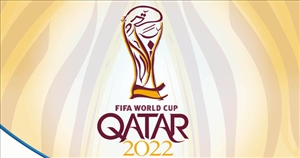How many times have we heard Hassan al-Thawadi, the public face of Qatar’s 2022 World Cup, utter those words when talking about the Gulf state staging football’s showpiece tournament?
He did it when Qatar originally launched their bid, maintained the same theme when they upset the odds to win the vote back in December, 2010, and has wasted no opportunity to repeat the west-meets-east sentiment in countless speeches as demand on his time intensifies in the build-up to the tournament in five years’ time.
Al-Thawadi is nothing if not obsessively dedicated and determined. Never once has Qatar’s World Cup organising chief wavered in his insistence that his country fully deserved to win the ballot and will put on the mother of all World Cups. Nothwithstanding the fact that 2022 will break with tradition and be held in winter for the first time. Notwithstanding the uncomfortable – some might say unsurmountable – cultural differences with the West.
But penny for Al-Thawadi’s thoughts at this awkward moment in time.
FIFA president Gianni Infantino assures us that the increasingly troubling diplomatic crisis in the Gulf region will not impact on Qatar’s World Cup preparations. There is, apparently, no plan B. But anyone who believes sport and politics don’t mix (whether they should or not is a different matter) is naïve or misguided – or both.
The fact is that the Saudi-led cutting of ties with Qatar – supported by Egypt, the United Arab Emirates, Bahrain, Yemen and Libya – is bound to have an effect on sporting relations.
Indeed, there are a number of examples in the region of sport and politics being intertwined. Take for instance the bad blood between Saudi Arabia and Iran that has spilled over into football. Games between Saudi and Iranian teams are now played on neutral ground almost de rigueur, many ironically switched the Qatari capital Doha though this is now a non-starter given the Gulf state’s diplomatic isolation.
It’s a thorny issue for the Asian Football Confederation but there is a bigger picture. Right now, the phrase “a World Cup for the Middle East” has a somewhat hollow ring about it. So has the oft-rumoured but never confirmed suggestions that Qatar may ultimately share the finals with its so-called neighbours.
Al-Thawadi would doubtless argue that 2022 is still a long way off but as things stand now, whoever writes his scripts must surely take account of the current geopolitical climate in the region.
The issues are piling up, not least the blocking of broadcasts from Qatar-based media outlets Al Jazeera and BeIN sports, the latter holding the rights in the Middle East to the English Premier League, La Liga and, most importantly, the World Cup.
Even more worrying perhaps for Qatar are slumping oil prices and the fact that some western firms contracted to operate on World Cup infrastructure are reportedly having second thoughts. None of which augurs well for Qatar’s intensive preparations which could be further jeopardised if FIFA’s (admittedly diminished in number) top-line sponsors start getting twitchy.
For Al-Thawadi’s sake – and that of his hard-working team – one can only hope World Cup organisers can ride out the storm. From the barrage of allegations over human rights abuses to Qatar’s very suitability as hosts – some of the criticism constructive and valid, some of it over the top – the 2022 hosts have had their fair share of brickbats to deal with.
Yet as unwanted distractions go, the current diplomatic stand-off, with all its ramifications, represents a whole new ball game. One which ultimately may or may not be kicked into touch.
Andrew Warshaw is chief correspondent of Insideworldfootball and was formerly Sports Editor of the European. Contact him at moc.l1751492359labto1751492359ofdlr1751492359owedi1751492359sni@w1751492359ahsra1751492359w.wer1751492359dna1751492359

